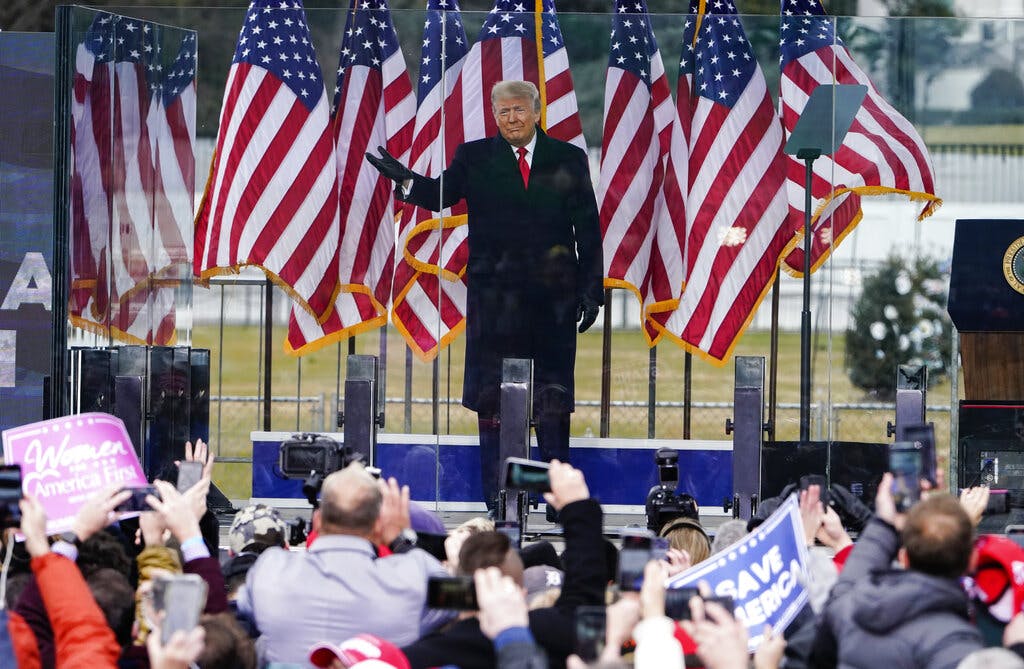America’s Second-Highest Court Rules That Trump Can Be Sued for January 6
Running for presidential re-election is not an official presidential act, the D.C. Circuit explains.

The ruling by an appellate court affirming a lower court one that President Trump can be sued in civil court for inciting the January 6 riot opens this former president — and his successors — to the possibility of crippling financial judgments.
The decision, which took months to render, was written by the chief judge of the United States Court of Appeals for the District of Columbia Circuit, Sri Srinivasan, a perennial short-lister — during Democratic administrations — for a spot on the Supreme Court. Now, the Nine could be called to review the ruling of a circuit often thought of as the nation’s second-highest court.
Judge Srinivasan was joined in concurrence by fellow circuit riders Gregory Katsas and Judith Rogers. They were asked to contend with applying the high court’s precedent in Nixon v. Fitzgerald — that a president enjoys absolute immunity for civil damages claims relating to his official acts — to the chaos at the Capitol.
The suit was brought by a handful of Democratic lawmakers and police officers who were at the Capitol on January 6, 2021. They seek civil damages from Mr. Trump and contend that his actions, “including ultimately his speech on January 6, sparked the ensuing riot at the Capitol.” That outcome, they argue, was part of his effort to “obtain a second term despite his defeat in the 2020 election.”
The circuit was persuaded that when the president — including the 45th one — “acts in an unofficial, private capacity, he is subject to civil suits like any private citizen.” Even the most industrious chief executive, Judge Srinivasan writes, “does not spend every minute of every day exercising official responsibilities.” When he acts outside the perimeter of those duties, he “does not continue to enjoy immunity from damages liability.”
The ruling’s crux is that “when a first-term President opts to seek a second term, his campaign to win re-election is not an official presidential act.” That is because the “Office of the Presidency as an institution is agnostic about who will occupy it next.” Campaigning to gain the presidency is not an official act of the presidency. When he runs for re-election, he does it as a private citizen.
Mr. Trump’s position is that a president’s speech on matters of public concern — like, say, the one at the Ellipse on January 6 — is invariably an official function of the office. It would be impossible to conceive of the presidency, he says, apart from its public face. Two courts, though, have now held that his involvement in the events of January 6 was “aimed at remaining in office for a second term” and not a core feature of the presidency.
The high court, in Nixon, explained that immunity from suits flows from the “functionally mandated incident of the President’s unique office, rooted in the constitutional tradition of the separation of powers and supported by our history.” The immunity is “capacious by design” because, as the justices wrote, the president “must make the most sensitive and far-reaching decisions entrusted to any official under our constitutional system.”
Judge Srinivasan’s reading of Supreme Court precedent leads him to conclude that presidential immunity “extends no further than the outer perimeter of a President’s official responsibility.” On these lines, the justices held that Pamela Jones’s sexual assault allegations against President Clinton concerned “purely private acts” rather than “acts taken in his public character.”
Judge Srinivasan allows that “there is no Bully Pulpit Clause in the Constitution,” but grants that to a president, the importance of speaking on matters of public concern is “incontestable.” Such speech would fall under the umbrella of protection if it was used to eulogize the “fallen leader of an ally” or offer the “nation’s condolences and support to a community reeling from a tragedy.”
Mr. Trump’s efforts to secure a second term, though, exceeded that perimeter because “an incumbent President’s interests in winning re-election have the same purely private character as those of his challengers.” The office itself is a study in stony indifference, as the “presidency itself has no institutional interest in who will occupy the office next.”
Now, the case goes back to the district court with the instruction that Mr. Trump enjoys no absolute immunity. The plaintiffs will still have to meet their obligation to show that Mr. Trump’s actions precipitated their injuries. Rulings regarding immunity are immediately appealable, though, meaning that the Supreme Court could soon entertain the question.
Mr. Trump has marshaled a related species of immunity — executive privilege — in the criminal case concerning January 6 brought by Special Counsel Jack Smith. The presiding judge in that case, Tanya Chutkan, has yet to rule on whether Mr. Trump’s argument warrants dismissal.

